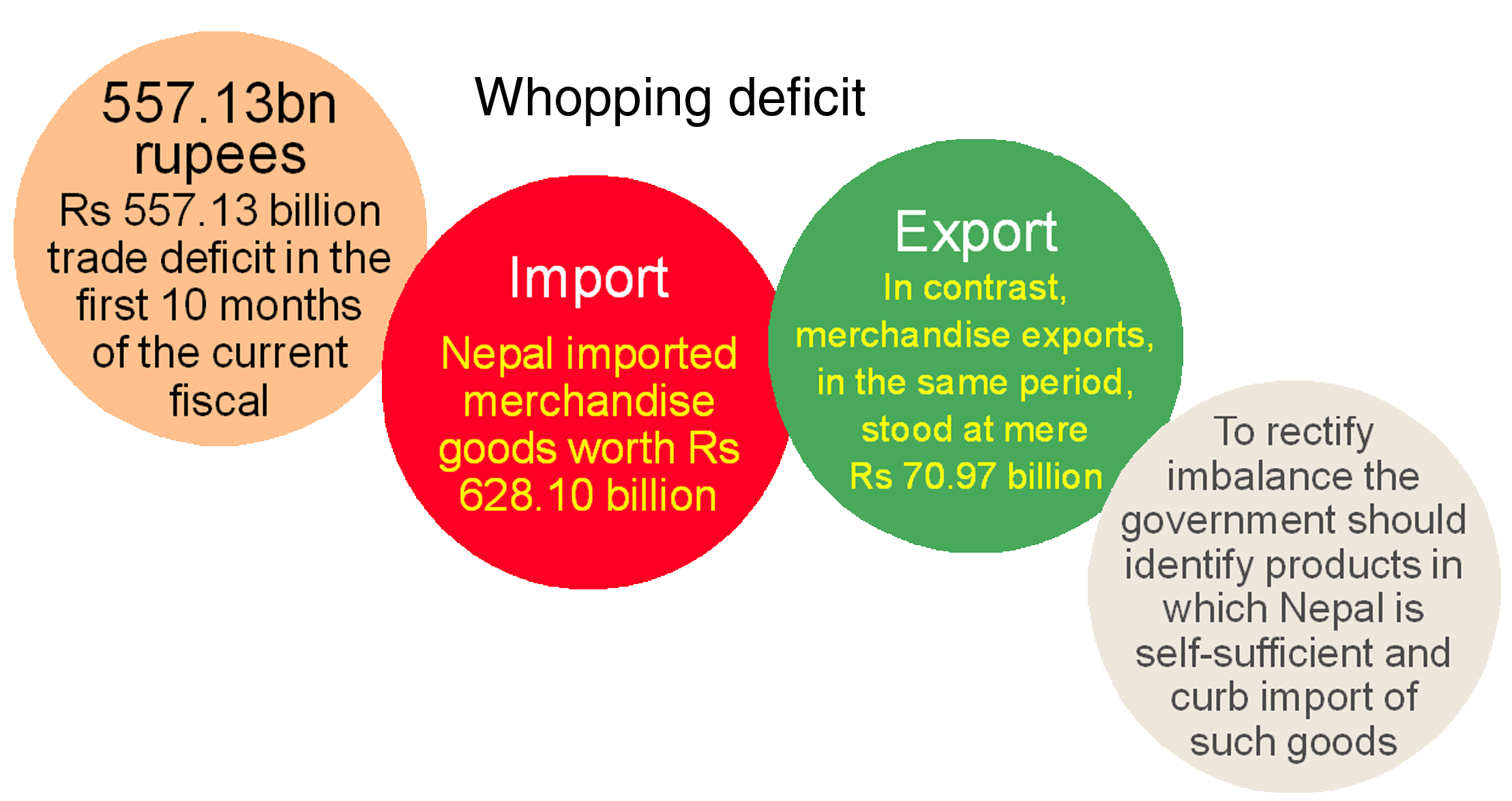Need to change policies to rectify trade gap
Import substitution has been mentioned at least once in the budget documents of the last five years as a means to narrow down Nepal’s ballooning trade deficit.
Nepal’s trade gap has been widening year after year and stood at a whopping Rs 557.13 billion in the first 10 months of the current fiscal year, show the data of Nepal Rastra Bank. This is because of discrepancy in exports and imports of merchandise goods.
If the current trend continues, Nepal’s trade deficit will further expand in the next fiscal when the country has to import goods to fulfill reconstruction needs.
So, does this indicate imports are not healthy for an economy? No. But the problem with Nepal is that it has not been able to offset the impact of imports by raising exports. In the first 10 months of the current fiscal year alone, Nepal imported merchandise goods worth Rs 628.10 billion. In contrast, merchandise exports, in the same period, stood at mere Rs 70.97 billion.
In other words, for every rupee of exports, the country imported Rs 11.3 worth of merchandise goods.
One of the reasons for burgeoning imports is that the country has to bring in everything from petroleum products to other raw materials from abroad, as very few of these goods are locally produced. This means the country has to first import to be able to export finished goods.
In this regard, sudden fall in imports also does not bode well for the country, as it indicates slowdown in industrial activities, which is not good for the economy.
But lately lots of goods meant for domestic consumption, which are being produced in the country at almost the same price as imported ones, are also being brought in from foreign countries. In other words, foreign products with relatively better competitive advantage are fast replacing domestic products.
This, in a way, is benefiting consumers, as they are being able to purchase goods of similar quality at relatively lower prices. And they are not likely to simply revert to domestic products unless they get value for their money.
So, the only way to lure consumers towards domestic products is to enhance competitive advantage of domestic industries.
Production capacity and cost competitiveness of domestic industries are eroding fast because of problems, such as prolonged hours of power cuts, inadequate transport infrastructure, lack of technology transfer and innovation, recurring labour disputes, shortage of facilities, such as warehouse and testing laboratory, lack of skilled human resources and policy inconsistencies. While these critical issues need to be addressed immediately to enhance competitiveness of domestic industries, what is also important is to identify imported foreign products manufactured using direct and indirect subsidies extended by governments of those countries.
It is well known that direct and indirect subsidies extended by developed countries, as well as India and China, are reducing competitiveness of Nepal’s agricultural products. Such benefits provide leverage to foreign firms to sell goods at cheaper prices, while domestic firms, that are not entitled to those benefits, suffer.
Also, the government should identify products in which Nepal is self-sufficient and curb import of such goods. However, such protection should be given to industries which produce high-quality products, so that consumers are not forced to consume low-quality products in the name of protecting Nepali industries. This will ensure the country’s hard-earned foreign currency is utilised only in areas where there is demand-supply gap between Nepal-made goods.
“In this regard, we want the government to reduce import duties on raw materials and impose higher customs tariffs and countervailing duties on selected imported products. This can only provide domestic industries an edge,” said Saurabh Jyoti, chairperson of Tax and Revenue Committee at the Federation of Nepalese Chambers of Commerce and Industry.
As of now, the Ministry of Agricultural Development has identified some imported cereal crops, vegetables and fruits that are gaining undue advantage over domestic products because of subsidies.
However, the Ministry of Commerce and Supplies, which is drafting the Safeguard, Anti-dumping and Countervailing Bill to protect and promote domestic industries, is yet to identify such goods, a senior MoCS official said.
If the government can identify those goods and impose extra duties on them, ‘more domestic industries can flourish here’, added Jyoti. This will ultimately create more jobs, generate more revenue for the government, and give a boost to capital formation process.






